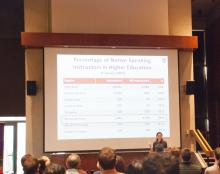by Amy Snyder Ohta, Associate Professor
For this year’s Andrew L. Markus Memorial Lecture, Dr. Junko Mori, Professor of Japanese and Department Chair of Asian Languages and Cultures from the University of Wisconsin-Madison, skillfully guided all who attended on a thought-provoking tour through various ideas related to the construct of the “native speaker” in the context of Asian language education in our world of increasing migration and global mobility. Her lecture, entitled “On Native-Speaker-Hood, Translingual Competence, and Asian Language Education” was presented on May 8th, 2017. The event drew an attendance of nearly one hundred students, faculty and community members.
In her lecture, Dr. Mori considered how the term “native speaker,” when simply contrasted with the term “non-native speaker,” obscures a wide variety of factors that are essential if we are to help our students to become proficient in Asian languages. Dr. Mori drew upon a wide variety of examples from her own experience of developing multiple identities of “applied linguist,” “department chair”, “foreign-born native-speaking language instructor,” and nearly 30-year resident of Wisconsin, as well as research in applied linguistics and cultural studies. She guided listeners to consider notions of “authenticity” and “correctness,” as related to what it means to learn an Asian language. Rather than the “authenticity” and “correctness” of the native speaker as a model for Asian language teaching/learning, Dr. Mori recommended that we focus on the notion of “translingual competence.” Translingual competence requires functional skills, but not perfection—Dr. Mori suggested that we should aim for “editable” language that communicates well, while still including errors. Translingual competence involves constructing one’s identity in another language and having intercultural skills to navigate systems of meaning and various perspectives, in situated contexts, while using language, gesture, and other semiotic resources. Dr. Mori described traditional foreign language instruction as “defined by the idealized native speaker” with a “focus on linguistic accuracy and pragmatic appropriateness.” Viewed through the lense of translingual competence, she explained how this is woefully inadequate for our students. At the same time, Dr. Mori noted that, in Asian language departments in today’s universities, foreign language teaching goals are often divorced from humanistic goals. She challenged the audience to consider how to bridge this gap, positioning applied linguists as uniquely situated to provide support during this process.
So, what should the focus of Asian language education be? Dr. Mori challenged her audience to move beyond notions of correctness and appropriateness; she encouraged faculty to help our students to develop identities and express themselves in Asian languages, to move beyond textbooks, to embrace the variety of ways that people learn languages, and to open the doors of the classroom to creatively incorporate a wide range of cultural and semiotic resources. What does this look like in practice? We must engage in an iterative process of critically reconsidering and revising our practices, so that we can ever more effectively guide our students toward their futures as translingual users of Asian languages.
The annual Andrew L. Markus Memorial Lectureship was established in memory of Andrew L. Markus, Associate Professor of Japanese Literature at the University of Washington from 1986-1995. Established through the generosity of family and friends, this annual lecture honors Professor Markus's contribution to the study of Asian languages and literatures.
